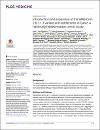| Author | J. Abu-Raddad, Laith |
| Author | Chemaitelly, Hiam |
| Author | H. Ayoub, Houssein |
| Author | Coyle, Peter |
| Author | A. Malek, Joel |
| Author | A. Ahmed, Ayeda |
| Author | A. Mohamoud, Yasmin |
| Author | Younuskunju, Shameem |
| Author | Tang, Patrick |
| Author | Al Kanaani, Zaina |
| Author | Al Kuwari, Einas |
| Author | A. Butt, Adeel |
| Author | Jeremijenko, Andrew |
| Author | Hassan Kaleeckal, Anvar |
| Author | Nizar Latif, Ali |
| Author | Mohammad Shaik, Riyazuddin |
| Author | F. Abdul Rahim, Hanan |
| Author | K. Nasrallah, Gheyath |
| Author | M. Yassine, Hadi |
| Author | Ghaith Al Kuwari, Mohamed |
| Author | Eid Al Romaihi, Hamad |
| Author | H. Al-Thani, Mohamed |
| Author | Al Khal, Abdullatif |
| Author | Bertollini, Roberto |
| Available date | 2022-09-02T08:41:56Z |
| Publication Date | 2021 |
| Publication Name | PLoS Medicine |
| Identifier | http://dx.doi.org/10.1371/journal.pmed.1003879 |
| Citation | Abu-Raddad, L. J., Chemaitelly, H., Ayoub, H. H., Coyle, P., Malek, J. A., Ahmed, A. A., ... & Bertollini, R. (2021). Introduction and expansion of the SARS-CoV-2 B. 1.1. 7 variant and reinfections in Qatar: A nationally representative cohort study. PLoS medicine, 18(12), e1003879. |
| URI | http://hdl.handle.net/10576/33632 |
| Abstract | Background The epidemiology of the SARS-CoV-2 B.1.1.7 (or Alpha) variant is insufficiently understood. This study’s objective was to describe the introduction and expansion of this variant in Qatar and to estimate the efficacy of natural infection against reinfection with this variant. Methods and findings Reinfections with the B.1.1.7 variant and variants of unknown status were investigated in a national cohort of 158,608 AU individuals: IntheAbstract with prior ; youmightwanttogivethecohortsizesofindividualsactuallyfollo PCR-confirmed infections and a national cohort of 42,848 antibody-positive individuals. Infections with B.1.1.7 and variants of unknown status were also investigated in a national comparator cohort of 132,701 antibody-negative individuals. B.1.1.7 was first identified in Qatar on 25 December 2020. Sudden, large B.1.1.7 epidemic expansion was observed starting on 18 January 2021, triggering the onset of epidemic’s second wave, 7 months after the first wave. B.1.1.7 was about 60% more infectious than the original (wild-type) circulating variants. Among persons with a prior PCR-confirmed infection, the efficacy of natural infection against reinfection was estimated to be 97.5% (95% CI: 95.7% to 98.6%) for B.1.1.7 and 92.2% (95% CI: 90.6% to 93.5%) for variants of unknown status. Among antibody-positive persons, the efficacy of natural infection against reinfection was estimated to be 97.0% (95% CI: 92.5% to 98.7%) for B.1.1.7 and 94.2% (95% CI: 91.8% to 96.0%) for variants of unknown status. A main limitation of this study is assessment of reinfections based on documented PCR-confirmed reinfections, but other reinfections could have occurred and gone undocumented. Conclusions In this study, we observed that introduction of B.1.1.7 into a naïve population can create a major epidemic wave, but natural immunity in those previously infected was strongly associated with limited incidence of reinfection by B.1.1.7 or other variants. Copyright: © 2021 Abu-Raddad et al. This is an open access article distributed under the terms of the Creative Commons Attribution License, which permits unrestricted use, distribution, and reproduction in any medium, provided the original author and source are credited. |
| Language | en |
| Publisher | Public Library of Science |
| Subject | cohort analysis
|
| Title | Introduction and expansion of the SARS-CoV-2 B.1.1.7 variant and reinfections in Qatar: A nationally representative cohort study |
| Type | Article |
| Issue Number | 12 |
| Volume Number | 18 |
|
dc.accessType
| Open Access |


